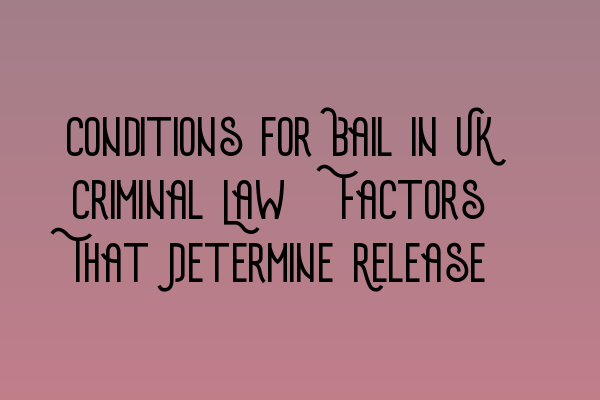Conditions for Bail in UK Criminal Law: Factors That Determine Release
Introduction
Bail is an important legal concept in the UK criminal justice system. It refers to the temporary release of an accused person, prior to their trial, with the condition that they will appear in court at the given date and time. The decision to grant bail and the conditions attached to it are determined based on various factors. In this article, we will explore the factors that influence the granting of bail and shed light on the conditions that may be imposed on the accused.
Factors Considered when Deciding Bail
1. Flight Risk
One of the primary factors taken into account when deciding whether to grant bail is the likelihood of the accused person fleeing the jurisdiction. The court must assess whether the individual is a flight risk based on their past behavior, personal circumstances, and ties to the community. Factors such as foreign nationality, lack of stable residence, and financial means to escape may increase the risk of flight.
2. Severity of the Offense
The nature and seriousness of the alleged offense play a crucial role in determining whether bail should be granted. In cases involving serious crimes, where there is a likelihood of a lengthy custodial sentence upon conviction, the court may be more inclined to refuse bail, considering the potential threat to public safety.
3. Criminal History
The accused person’s criminal history also plays a role in the bail decision. If the individual has a history of convictions or is currently on probation or parole, it may significantly impact the court’s decision. Previous instances of failing to appear in court or breaching previous bail conditions will also be taken into consideration.
4. Likelihood of Reoffending
The court will assess the likelihood of the accused person committing further offenses while on bail. If there is a strong risk of reoffending, bail may be denied or strict conditions may be imposed to mitigate the risk. Factors such as a history of violence, drug abuse, or previous instances of breaching court orders will be considered.
5. Community Safety
The court’s primary concern is the safety of the community. If the accused poses a risk of harm to others, bail may be refused or stringent conditions may be imposed to minimize potential harm. This is particularly relevant in cases involving offenses against vulnerable individuals or where there is evidence of a pattern of violence.
Bail Conditions Imposed
When bail is granted, the court may impose certain conditions to ensure the accused person’s compliance with the legal process and to protect public safety. The conditions may include:
1. Reporting to the Police
The accused may be required to report to the local police station at specified intervals, providing their current address and contact information. This helps to ensure that the accused remains in touch with the authorities and does not abscond.
2. Restriction on Travel
The court may impose travel restrictions, limiting the accused person’s ability to leave a specific geographical area. This can include surrendering passports or travel documents to the authorities and seeking permission before traveling outside the designated area.
3. Curfew
A curfew condition may be imposed, requiring the accused person to remain at a specified address during certain hours of the day or night. Electronic monitoring can be used to monitor compliance with this condition.
4. Non-Contact Orders
In cases involving domestic violence or harassment, the court may impose a non-contact order, prohibiting the accused person from contacting the alleged victim or other specified individuals. Breaching this condition can result in immediate arrest.
5. Surety or Financial Conditions
The court may require the accused person or their family/friends to provide a financial surety or security deposit as a guarantee of future appearance in court. Failure to comply with the financial conditions may result in the forfeiture of the amount deposited.
Conclusion
The decision to grant bail and the conditions attached to it are made on a case-by-case basis, considering the various factors discussed above. These factors help ensure that the accused person’s rights are balanced with public safety concerns. Bail conditions aim to secure the accused person’s presence at trial while safeguarding the interests of the community. It is essential to consult with an experienced criminal defense solicitor to understand your rights and the factors that may influence the bail decision in your specific case.
Contact SQE Criminal Law & Practice Law UK today for expert advice and assistance regarding bail conditions and other criminal law matters. We are committed to providing professional legal services to help you navigate the complexities of the UK criminal justice system.
